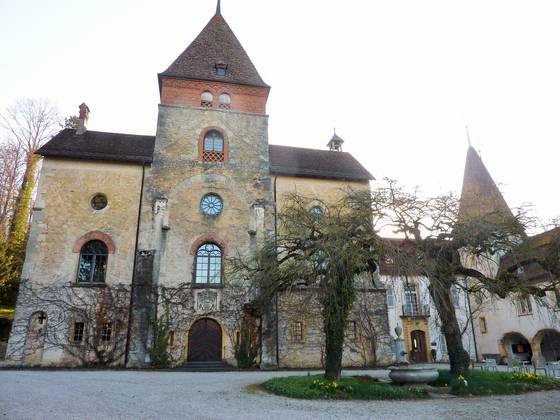CUSO Workshop on Multilingual Writing and Translation, September 1, 2021, Report from the Field by Sofia Baliño
The CUSO workshop on “Multilingual Writing and Translation,” organized by Dr. Patrizia Zanella from the University of Geneva, brought together PhD students, post-doctoral scholars, and professors for an exciting afternoon that encouraged us to reimagine how we understand language, innovation, social precarity, and community.
Our guest presenter, Dr. Jennifer Reimer Recio, Assistant Professor at Oregon State University – Cascades, began by introducing us to the work of Javier Huerta, the poet and author of American Copia: An Immigrant Epic (2012). She also set out some of the key questions and issues that have emerged in the study of Chicano/a poetics. We began our analysis of Huerta’s work by considering definitions, with Dr. Reimer encouraging us to question our assumptions about what terms such as interlingual, plurilingual, translingual, and multilingual mean – and also what those terms do to our understanding of texts, access to languages, and the relationship between and across languages.
Dr. Reimer then walked us through a close reading of American Copia, introducing us to its use of interlingual puns, translingual layering, and code switching. Many of these puns and references riffed off of the image of the “grocery store,” which recurs as a site of daily life, a reminder of social precarity, a memory of childhood, a test of belonging, and a joke among friends. Through these examples, Dr. Reimer showed us how having access to both English and Spanish, and therefore the ability to code-switch between languages and language cultures, affects our understanding of Huerta’s poetics. In turn, she encouraged us to consider how these techniques can be used to assert community and belonging, especially in situations of social precarity.
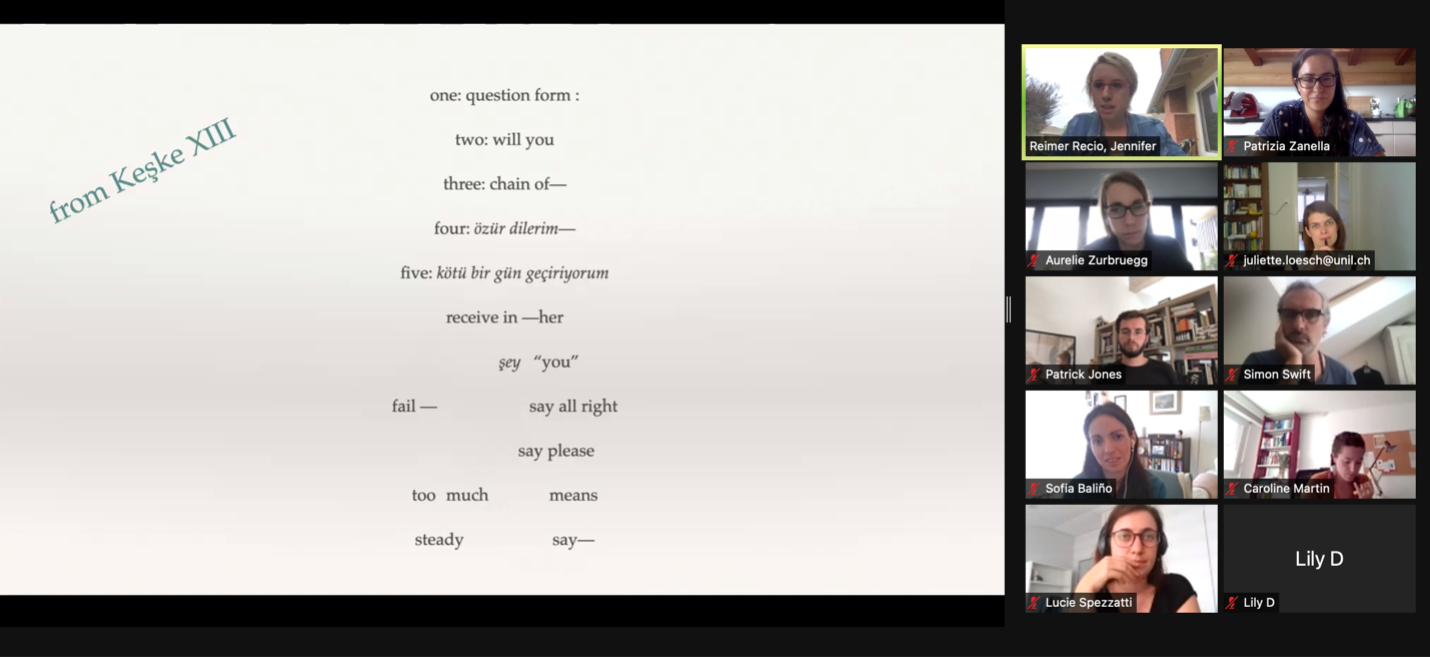
Dr. Reimer shared her own experience of seeing her work translated into Turkish and what she learned about the author-translator relationship. She gave us a preview of her forthcoming book Keşke, named after the Turkish word “if only.” The poetry collection revisits The Odyssey through the voice and perspective of Calypso while capturing the political moment of living in Turkey in 2016 from the perspective of an outsider. She described how her manuscript incorporates allusion, intertextuality, wordplay, and slippages between and across languages, with the goal of expressing a new visual grammar of female imagination.
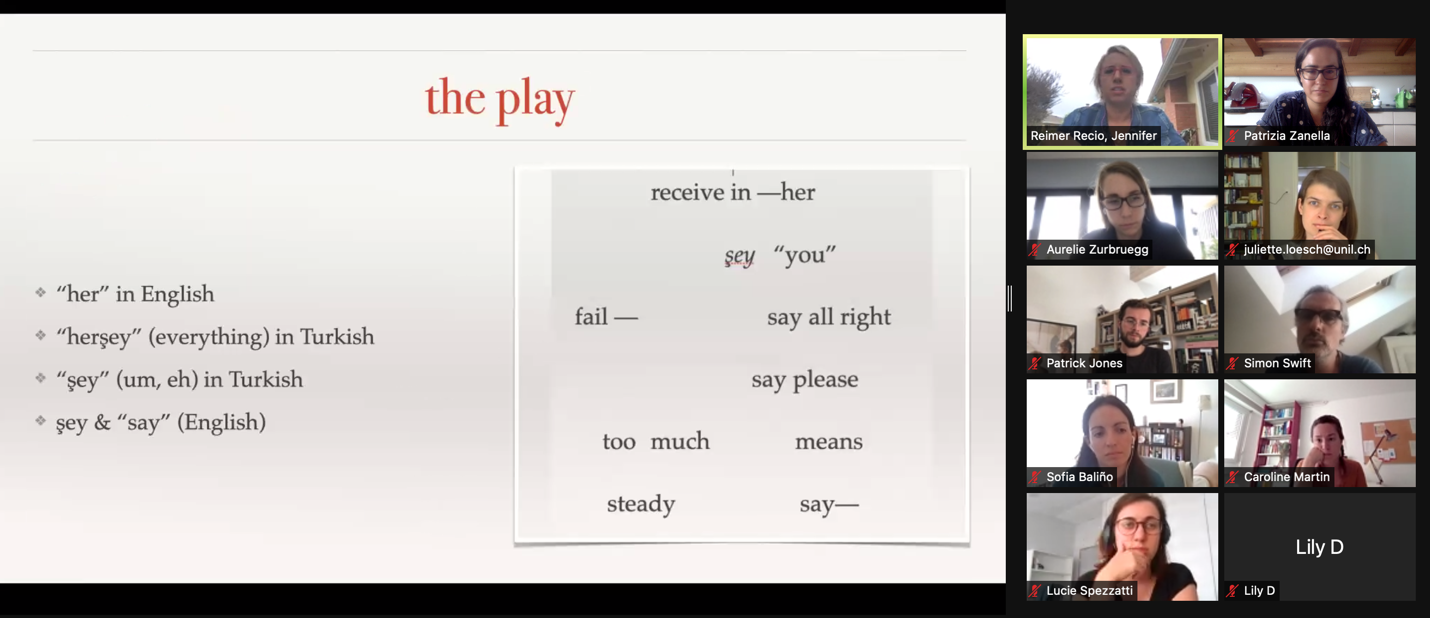
After the presentation and discussion, we undertook a creative writing exercise to explore our own understanding of wordplay between and across languages. We were encouraged to try manipulating sounds, meaning, and resonance in order to experiment with instability or motion in different languages or cultures. The examples we shared were varied and engaging. Participants tested out the use of the “verlan à l’envers,” a form of French slang, against French and English and rap music; revisited mistranslations in signs seen across the world; looked at numbers in Turkish and the word associations that arise in English; and reminisced about favorite scenes from sitcoms such as I Love Lucy.
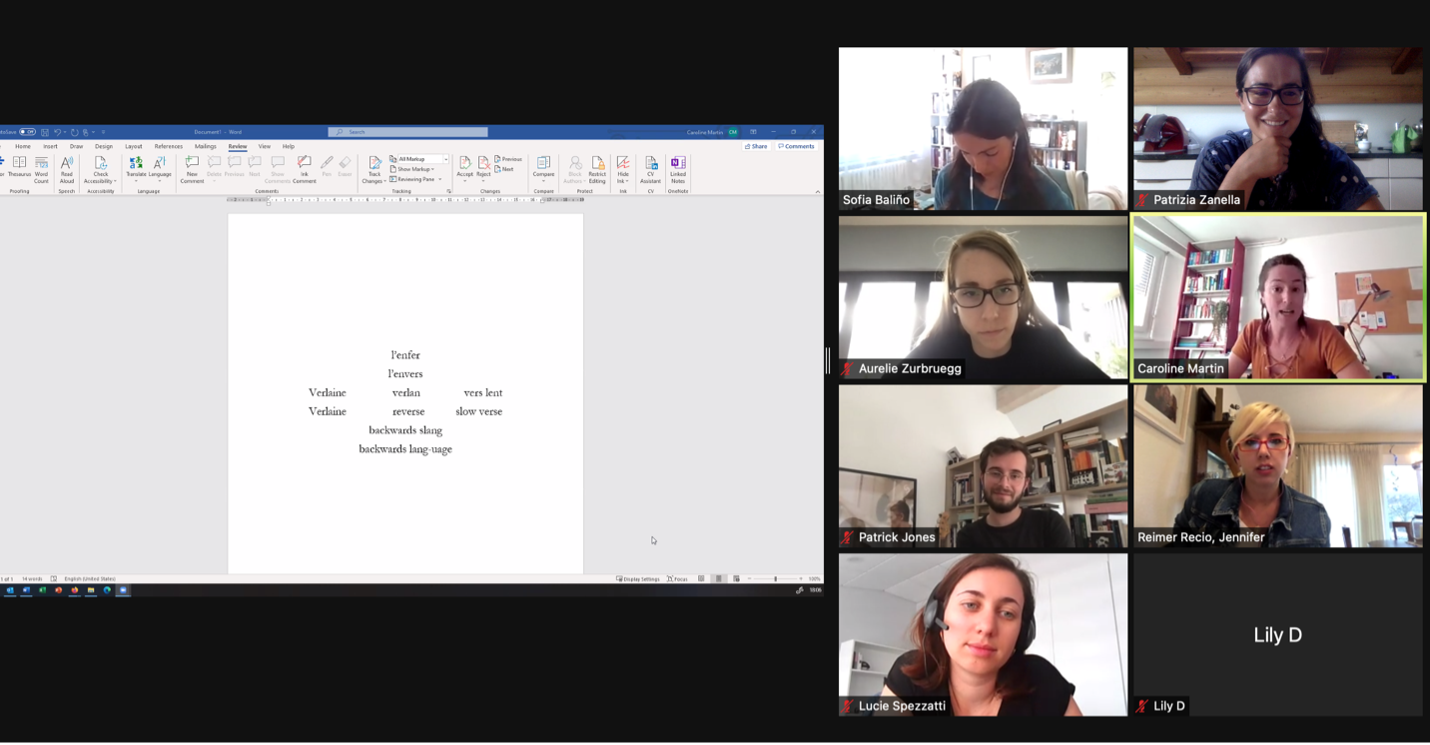
Two presentations from PhD students brought the afternoon to an exciting close and provided us with rich food for thought on literary translation and mediation. First came a presentation from Lucie Spezzatti from the University of Geneva’s Faculty of Translation and Interpretation, who is undertaking a genetic analysis of Bernard Comment’s translation of the Italian writer Antonio Tabucchi. The latter was himself a translator and scholar of Portuguese literature, notably of the works of Fernando Pessoa. Lucie walked us through her research questions, from her choice of translator to her interest in the concept of “closelaboration,” where authors and translators share an intense bond. She also asked us to consider how a translator’s authorial status in their own right can affect their translations, while posing thought-provoking questions about the challenges of archival research.
The day concluded with a presentation from Aurélie Zurbrügg from the University of Fribourg, calling in from North Carolina to share with us her PhD research, entitled “Writing on Walls: Message, Mediality, and Modes of Address: Study of Media, Intermediality, and Its Limitations.” She showed us how she is exploring new ways to define the concept of “medium,” and how the wall, with its materiality, ubiquity, and versatility, can be treated as a medium in its own right. She asked us to consider whether a medium is an art form or the medial embodiment of the artistic message, and along the way, she encouraged us to consider tough questions concerning self-expression and transgression.
Our virtual meeting format, while required by the ongoing pandemic, also helped reinforce our shared interests in understanding linguistic and cultural differences and exchange. We met across time zones, continents, and language backgrounds, calling in from places ranging from California and North Carolina to Geneva, Lausanne, and the Valais. By the time our session drew to a close, we had developed a deeper appreciation for how we understand language and community in our daily work, and also for how we engage with each another.
Bern/Online, 21 and 22 June 2021 Harvesting Language in the Field: Methods in Sociolinguistic Data Collection –A report by Antonia Vogler and Lara Portmann
The Harvesting Language in the Field workshop began with Professor Miriam Meyerhoff’s presentation concerning sociolinguistic variation in Auckland, New Zealand. After her lecture, all participants took part in small group discussions. We were given various scenarios in which a PhD student prepares and embarks on their fieldwork – we worked together to identify pitfalls and complications that are common for sociolinguistic researchers. After a refreshing coffee break, there were several participant presentations which complemented the methodological approaches discussed beforehand. Brayan Andrey (UniNe) presented his MA these project, in which he examined stereotyping and discrimination in the court room based on features related to race and African American English. His methodological approach involved experimental sociolinguistics, including a mock jury and a matched guise test. He was followed by Danielle Tod (UniBe), who presented her PhD project on the sociolinguistic variation of English in the Kingdom of Tonga, as well as her ideas for future research. Monday morning’s final presentation was by PhD student Lena Stückler (UniBe), who is currently investigating the endangered Unserdeutsch Creole.
After our lunch break, Professor Crispin Thurlow introduced us to Discourse Ethnography and a three-step analytic framework which includes mediatization, mediation and remediation. Afterwards, participants brainstormed new contexts and/or ways to apply this framework, which we then discussed as a large group. After a short coffee break, the afternoon continued with participant presentations. Emily Smith (UniGe) talked about her project, which is based on a corpus analysis of the term ‘thing’ in early modern drama. Xi Cheng (East China Normal University, Shanghai and UniBe) followed, presenting his project which incorporates a corpus analysis of three different types of texts related to the China-US trade wars (media, government, and academic). Lastly, Olivia Droz-dit-Busset (UniBe) concluded Monday’s session; as she discussed her SNF-funded project which analyzes elite language workers. Namely, she investigates the discourse surrounding social media influencers and advertising copywriters. Many of us were able to continue discussing the day’s events together at dinner in Bern, including Professors Thurlow and Britain.
On the second morning, Prof. David Britain (UniBe) gave a lecture on Big Dialect Data, introducing participants to the use of big data in sociolinguistic research. He discussed the use of survey data (collected through internet-based questionnaires or smartphone applications) and data mining (e.g. tweet analysis or website analysis), showing that big data can in particular provide much needed information on geographical variability, as we can use the same method across many different sites. Following this general introduction he discussed two examples: the English Dialects App (Leemann, Kolly & Britain, 2018) and the BBC Future Survey ( Blaxter & Britain, 2021). He used these examples as a way to reflect on methodological questions of both traditional sociolinguistic data collection and the opportunities and challenges of using big data in sociolinguistics. In the workshop part that followed the lecture, the participants discussed how they might use big data in their own (also discourse analytic) projects as well as the specific challenges that would come with using big data in a much smaller or a much larger setting (a single Anglophone city or the whole Anglophone world). In the second half of the morning, Andrin Büchler and Matthew John Hadodo (both UniBe) presented their work. Andrin Büchler's PhD research examines the Swiss German variety spoken by Romansch speakers in Bern. Matthew Hadodo shared results from his past work on Istanbul Greek as well as plans for his current, postdoctoral research (also on the Istanbul Greek community and dialect).
In the afternoon, Professor Cynthia Gordon introduced us to the field of Interactional Sociolinguistics, which investigates naturally occurring conversation. Her presentation as well as group activity (featuring a recorded sample of family talk) provided participants with valuable inputs regarding the methodological approaches to interactional data analysis. After a coffee break with some ice cream, the workshop continued with three participant presentations; Kathrin Baumann (UniBe and Georgetown University) began by introducing her MA thesis project idea which centers around food and lifestyle digital discourse. This presentation was followed by Antonia Vogler, whose project revolves around the relational work strategies employed in online advisory videos. Lara Portmann (UniBe) gave the final presentation of the workshop, which focused on the elite language work of UX writers. Organizers Dr. Gwynne Mapes and Dr. Hannah Hedegard concluded the workshop by adding some final remarks related to the variety of methodology approaches covered across the two days, as well as some overarching themes.
Lausanne (online), 25 and 26 March 2021: ‘Language and Work’ – Concepts, Questions and Methods – A report by Beatriz Duarte Wirth, University of Lausanne
This two-day workshop organized by Dr Maria Rosa Garrido Sardà (UNIL) was held online via Zoom and enjoyed great success. On the first day, Maria Rosa warmly welcomed the participants and speakers, explained the day’s program and encouraged the PhD students as well as the lecturers to introduce themselves and talk about their research projects. Throughout the workshop, different strategies were put in place in order to create a sense of community and allow participants to network despite the online format. Long and frequent breaks were also scheduled so as to avoid Zoom fatigue. MA students and doctoral candidates from different Swiss and European universities attended the workshop and engaged actively in the discussions that followed the presentations.
The first lecturer, Dr Alfonso Del Percio (University College London - UCL), gave a talk entitled Genealogies of language and work in which he provided an overview of the history of the work on ‘language and work’. In this thought-provoking presentation, the speaker challenged many concepts, such as genealogies and history, and denounced the systemic constraints that limit and orient the research stories we choose to tell and also shape the way we tell these stories. Alfonso structured his lecture around the following axes, dominated labour, discriminated labour and exploited labour. Later that day, the second lecturer, Dr Kamilla Kraft (University of Copenhagen), built on the problematization of ‘language and work’ with her presentation entitled Language and mediation at work. In this lecture, she discussed the qualitative research she carried out in construction sites in Denmark. Kamilla skilfully interwove the topics of migration, race, gender and work and showed the role language plays in both strengthening and weaking these ties. At the end of the day, there was a data session with a PhD student, Mingdan Wu, from UCL. This session was carried in an interactive manner by splitting the participants into two breakout rooms where we discussed the data handout provided by the student. We came together as a group at the end of the day to share our thoughts about her work. The student seemed pleased with the participants’ input and general suggestions.
On the second day, Dr Elisabeth Barakos (University of Hamburg & Aston University) presented her work on Language work(ers) and elite multilingualism where she engaged critically with the concepts of multilingualism and elite. Elisabeth discussed her research on elite multilingualism as a social phenomenon and the role it plays in reinforcing social inequalities. The second speaker of the day was Beatriz Lorente (University of Bern) who discussed her project on Language and affective labour. The lecturer put forth the meaning of care work and the relationship between language and care, notably in the contexts of domestic work and medical work. Beatriz problematized the Western tradition of opposing rationality and emotionality and the linguistic and social consequences this dynamic has on affective labour. In the second half of the day, there was another student data session with a doctoral candidate, Lara Portmann, from the University of Bern. This session followed the same pattern as the previous one, with discussions in breakout rooms and then with the whole group. The PhD student seemed satisfied with the advice given and the directions suggested.
At the end of the day, Maria Rosa encouraged participants to reflect on the topics raised throughout the workshop and reflect on the very meaning of ‘language and work’. Lecturers and students were invited to exchange ideas in breakout rooms in order to create a synthesis of they had learned as well as discuss what aspects of the field need to be further explored. This event certainly allowed students to connect with other students from different universities and diverse backgrounds, discover new theoretical frameworks, widen their repertoire of references and foster a more holistic and critical thinking in relation to language and work.
Lausanne, 16-17 February 2018: Methodological approaches to synchronic and diachronic heritage language data - a report by Stefania Forlani, University of Bern
The workshop was organized by Prof. Anita Auer (Unil), Dr. Jennifer Thorburn (Unil), and Dr. Adina Staicov (Unizh) and was aimed at postgraduate students but, due to its content, it was also very useful for MA students who are thinking about working in sociolinguistics, language variation and language change. In fact, it was a very practical workshop where participants could understand how a study is planned, carried out, and how to overcome potential problems.
The first speaker, Prof. Naomy Nagy (University of Toronto), presented her project, which is focused on heritage languages spoken in Toronto (HLVC). She used her project as a guide to explain methodology and introduce theoretical questions. We discussed how to plan the study including field work, how to make contacts with the informants, and how to behave during an interview. We also talked about ethics, whose requirements vary from country to country. I, together with other participants, had the opportunity to present my own work and to explain how I organized it and the problems and solutions I found. We then discussed our different fieldwork experiences and our discoveries, depending on what stage of the study we were at.
In the afternoon, Dr. Adrian Leemann (Lancaster University) talked about theory and practice in sociophonetics, an emerging field of study. After a first session focused on theory, he illustrated methodology, data collection, data sampling, data analysis and reporting in detail. We could see how to use technology, i.e. smartphone apps, to collect data from speakers via the Internet (this was also the subject of our last session). Dr. Leemann’s presentation included several practical examples as well. The exhaustive part about reporting contained also a link to the Academic phrasebank, a very helpful page for any PhD student who needs to write a report.
On Saturday, we examined how to work on historical data, thanks to Dr. Markus Schiegg (FAU, Erlangen) who presented his project “Corpus of Patient Documents” (CoPaDocs). This project investigates old documents from psychiatric patients who lived in hospitals in the nineteenth and early twentieth centuries. The research examines language history “from below” instead of taking into consideration the standard imposed “from above”. Dr. Schiegg made us do an exercise on a scanned letter, so we could understand even the first practical difficulties related to this kind of research: transcribing an old letter without mistakes isn’t an easy task!
The last session was about crowdsourcing heritage language data. Here, Prof. Auer described how her project Swiss Islands in North America used a smartphone app in order to collect material from a distance. With this app, the informant can upload their voice recordings but also photos that express their Swiss identity. We concluded our workshop discussing the pros and cons of using crowdsourcing methods in linguistic research.
On behalf of all the participants, I want to thank CUSO, the organizers and the speakers who – very kindly – shared their papers with us. This was an extremely enriching workshop.
Neuchâtel, 30 April 2017: Change in English Language and Literature – a report by Aleida Auld, University of Geneva
As a doctoral student, constraints of time and energy usually require staying devotedly focused on one’s historical period and subject matter. It is thus a particular pleasure to go further afield, to literary landscapes, foreign and fresh.
On Sunday, April 30, CUSO hosted a doctoral workshop in tandem with the biennial conference of the Swiss Association of University Teachers of English (SAUTE). The conference’s plenary speakers, now workshop participants – Professors Ewan Fernie, David Simpson, and Felipe Fernández-Armesto – guided us from G.W.F. Hegel’s Enlightenment to Walter Benjamin’s Modernism, to present-day research on the human animal and cultural production.
Along the way, we addressed critical trends, like the revived interest in character studies (drama), and in the relationship between the lyric speaker and the non-fictional poet (poetry). We discussed detailed questions on the texts, such as, what does Benjamin mean in ‘The Critique of Violence’ (1921) by the educative power [...] in its perfected form? But we also pondered and debated more elemental topics, among them, how cultural production is related to time, and the purpose of language.
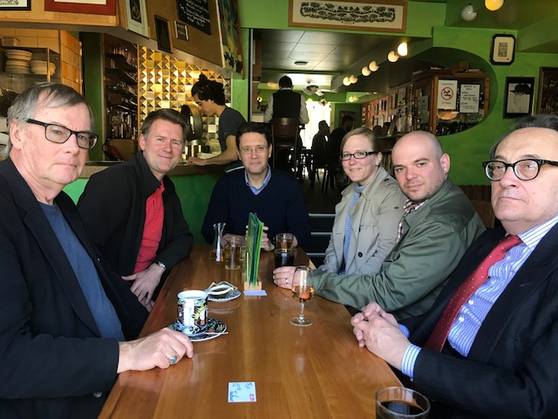
In the afternoon three doctoral students gave work-in-progress papers. Vincent Laughery, based at the University of Lausanne and a recipient of the Swiss National Science Foundation Doc.CH scholarship, presented an overview of his project on metaphor and agency in Shakespeare’s tragedies. Kilian Schindler, from the University of Fribourg and another recipient of the Doc.CH, explored Christopher Marlowe’s The Jew of Malta (c. 1590) as a potential response to Machiavelli as an ethical thinker, particularly in the character Barabas’s ‘ethics of dissembling’. Representing the University of Geneva, I gave the third paper on ‘Canonical Change and the Material Text’, which offered a theoretical overview of my doctoral project and posited some tentative general arguments. Vincent, Kilian, and I received insightful feedback from the conference’s plenary speakers and the other workshop participants. Genuinely useful responses were also offered by post-doctoral researchers Emma Depledge and Alice Leonard, who went out of their way to attend the session.
On behalf of all the participants, I would like to warmly thank Ewan, David, and Felipe, as well as the organizers at the University of Neuchâtel, Professors Martin Hilpert, Margaret Tudeau-Clayton, and Patrick Vincent and, last but not least, doctoral assistant Anne-Claire Michoux.
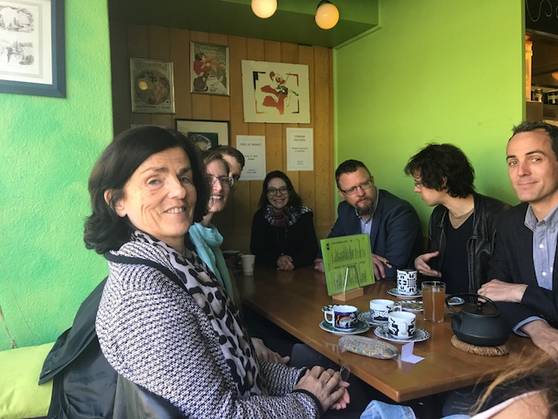
Lausanne, 2-3 September 2016: Big Data and Bad Data: Challenges of quantitative and qualitative research methods in linguistics – a report by Tobias Leonhardt, University of Bern

This workshop focused on the methodological obstacles that present themselves when working with the increasing amounts of available data in diachronic as well as synchronic linguistics and brought together a small contingent of historical linguists and dialectologists of English varieties. It was highlighted that, besides many crucial differences, there are also many overlaps between the two strands in linguistics, and that therefore, at least to some degree, the methods used in corpus linguistic research are not restricted to those strands. Over two days, ten presentations and three discussion sessions helped further our understanding of not just the work of researchers in the other strand but also that of our own.
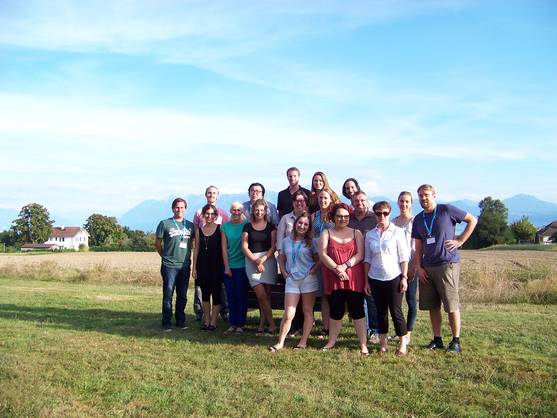
In the first block, Susan Fitzmaurice (University of Sheffield), Daisy Smith (University of Edinburgh), Moragh Gordon (Utrecht University), and Yasushi Miyazaki (Kwansei Gakuin University) held their presentations. Among other things, they raised questions as to the definition of what is and what is not a token, whether corpus research requires for a key term to be explicitly mentioned or if it suffices for it to be described, circumscribed or implied. They all reminded us, in different ways, that our linguistic sources, our geographical sites and our more or less known authors and contributors all constitute complex linguistic realities, and they made it apparent that the human component can never be taken away completely but is always a requirement in some ways, regardless of there being more corpora or more sophisticated tools for our analysis. These and other issues were taken up in the open discussion where it was reinforced that our objects of interest (contemporary spoken varieties, written varieties in letters and manuscripts, etc.) must not be confused with the corpora that contain them. Furthermore, using tools for the analyses of corpora that contain our objects of interest requires a lot of sensitivity to all kinds of factors and issues, which renders corpus analysis slower than it might be assumed at first.
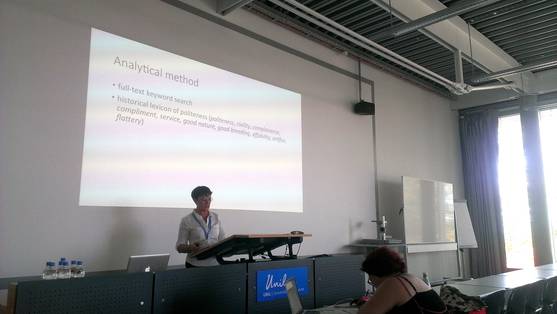
The second day was started with presentations by Alexander Bergs (University of Osnabrück), Sarah Grossenbacher (University of Bern), and Tino Oudesluijs (University of Lausanne). From these presentations there emerged a common theme, namely the necessity for human intervention when working with corpus analysis tools, which made for a perfect continuation of the previous day and fed nicely into the subsequent discussions: Search outputs must not be interpreted as representative of linguistic realities, and they must not be confused with results but need manual correction – which can only be undertaken adequately when there is a profound understanding of the structure of the corpora, its compilation methods, and a myriad of other historical and sociolinguistic aspects that contribute to the complex linguistic realities we ultimately (probably) aim to capture and describe.
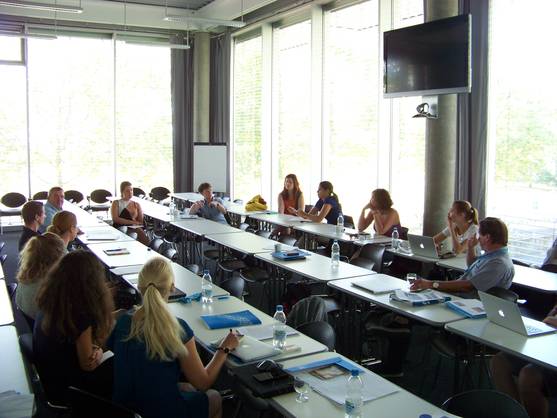
The last block featured presentations by Daniel Schreier (University of Zurich), Nadine Chariatte (University of Bern), and a joint paper by Tobias Leonhardt, Sara Lynch and Dominique Bürki (University of Bern). It was, once again, demonstrated how a profound understanding of the corpora enables the right questions to be asked and the right methodologies to be chosen in an attempt to answer them. The best results are gained by not forgetting the speakers, communities and histories behind the data they provide, and by being sensitive to individual factors and by identifying the possibilities as well as limitations of our corpora accordingly. This holds true for contemporary speech that can be recorded today as well as the historical data in manuscripts and letters from various archives that survives from decades or even centuries past. The last discussion session, then, was concluded with a more or less open question: Is there bad data at all, or is there only bad scholarship?
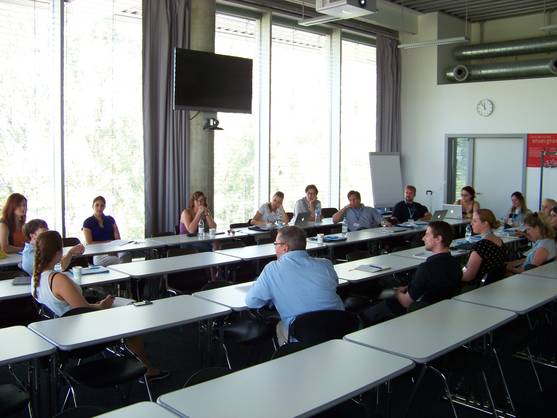
Doubtlessly, this workshop has been fruitful and engaging. A big ‘Thank You’ goes out to the organisers, Tino Oudesluijs (University of Lausanne) and Moragh Gordon (Utrecht University), for creating this opportunity and for being wonderful hosts!
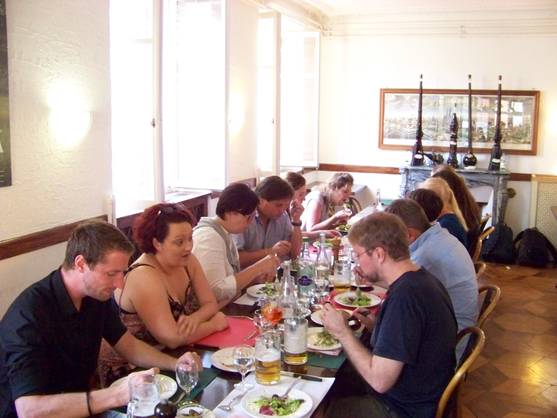
Bern, 6-7 June 2016: Beside Words: Rethinking Discourse/Text as Theory and Practice – a feedback by Joseph Comer, University of Bern
This workshop, led by Professor Susan Foster (University of California, Los Angeles, USA), Professor Rodney Jones (University of Reading, UK) and Professor Crispin Thurlow (University of Bern), was engaging and highly enjoyable. In discussing the various spatial, embodied, material and affective turns that the humanities and social sciences are undergoing, we were encouraged to think creatively, critically, and perhaps queerly about the limits of academic theory and practice. This was a great success of the workshop – the freedom all students had to rethink existing conventions and received practices. Throughout, we were made keenly aware of the limitations of creativity: we exposed the beguiling but misleading view that it functions through the complete unshackling of constraint. As Sisyphean as this may sound, our scholarly work is always creative and change-making – no matter how monolithic our institution/s, or how mammoth our task to describe the world, seems. In doing our work we (must) always inhabit the space beside those who’ve come before – we can never truly or simply move beyond.
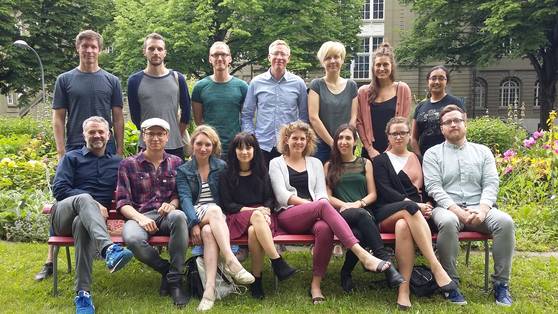
Workshop participants in the UniS garden in Bern
Neuchâtel, 28 November 2015: CUSO Workshop on Tools for Digital Humanities: A Practical Workshop – A Report by Tobias Leonhardt, University of Bern
The goal formulated by Prof Elena Pierazzo (Université Stendhal Grenoble III) at the outset of this workshop sounded rather improbable at first: To teach the basics of XML in, and here I quote, “five minutes”. Sure enough, however, it is well within this time frame that she shows us a slide that says, in big letters, “That’s all folks. You have learned XML!”, we start to code away, and soon even succeed in computing some cooking recipes.
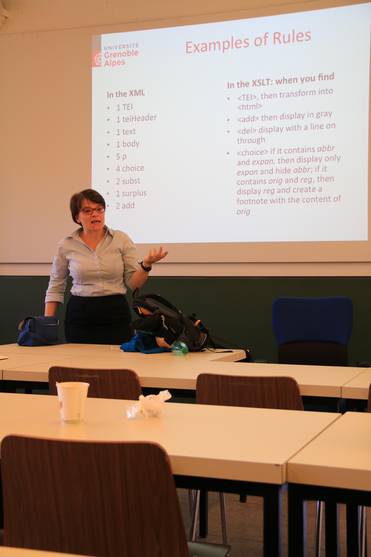
XML is an exciting language that was new to most of the workshop participants, but Prof Elena Pierazzo enabled us to see and learn a lot about it in only one day. She showed how a myriad of tasks that we do in our every-day lives are possible only because somewhere in the process XML is spoken: not only is this true for many computer programs we use on a regular basis such as Word, but also for cash transactions or refuelling a car. Besides enhancing our consumer vision, we adopted the developer perspective, learned about mark-ups, elements, attributes, syntax, et cetera, and thus acquired the skills to work with XML ourselves. The software we used is called Oxygen, which is, due to its nicely structured interface and its functionality, ideal for learners and experts alike. The tasks soon became more difficult, and instead of cooking recipes, old manuscripts had to be transcribed. How to treat main text and annotations, indentions and page breaks, deletions and missing or illegible parts? In trying to answer these questions, it became apparent what XML is capable of, how seemingly simple things require careful and very much conscious planning and coding, how the basics may indeed be conveyed in five minutes but that, like so often, mastery requires a lot of practice. These exercises and the insights they provided are transferable so that all participants, and not only those focusing on manuscripts in their academic career, have profited from the workshop. Tackling LaTeX or Macros, for instance, does not seem to be impossible anymore.
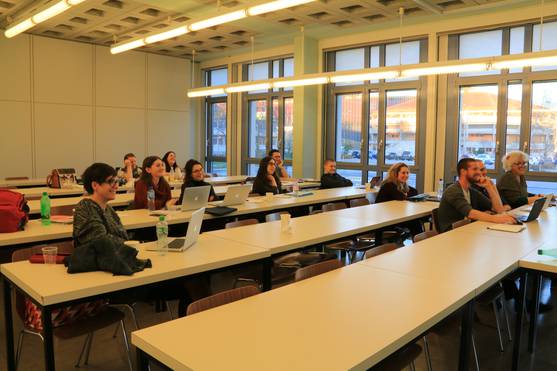
On behalf of all the participants, I wish to thank Prof Elena Pierazzo for equipping us with this XML toolkit (and cooking recipes), and Erzsi Kukorelly (University of Geneva), Lucy Perry (University of Lausanne) and Patrick Vincent (University of Neuchatel) for the organization of this workshop. It was enjoyable and fruitful to delve into a new topic, to interact with others during coffee and lunch breaks, or even to go on a short walk at Lake Neuchatel in the autumn sun.

Schloss Münchenwiler, 27-29 March 2015: CUSO Workshop on Conducting Sociolinguistic Research on Englishes Near and Far – A Report by Tino Oudesluijs, University of Lausanne
Sociolinguistic and dialectological fieldwork can be a time-consuming and exhausting enterprise. It can nevertheless also be immensely rewarding, since it usually allows the researcher to collect previously unrecorded data, the analyses of which can result in new linguistic hypotheses. To date, it is, however, an underexposed part of the research process in the sociolinguistic literature. For this reason, Prof. Dr. David Britain, together with Dr. Susan Fox, Tobias Leonhardt and Dominique Bürki (all from the University of Bern), organised a workshop to introduce the participants to this fundamental aspect of sociolinguistic research. Prof. Kazuko Matsumoto (University of Tokyo), Prof. Daniel Schreier (University of Zürich), Dr. Andrea Sudbury (University of London) and PhD student Nicole Eberle (University of Zürich) were invited to come to Schloss Münchenwiler and share some of their first-hand experience with the participants.
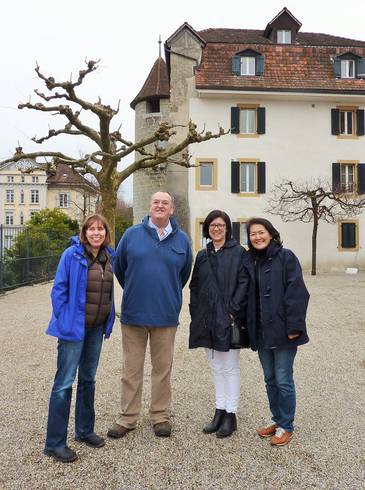
The workshop lasted three days, starting on Friday at 13:00 and finishing on Sunday at lunchtime. This enabled the invited speakers not only to present their research and experience during lectures but also to lead interactive seminars in which everyone was encouraged to discuss the different aspects of sociolinguistic research. Finally, all participants were asked to present their own research, which gave everyone the possibility to obtain feedback from both the other participants as well as the experienced researchers.
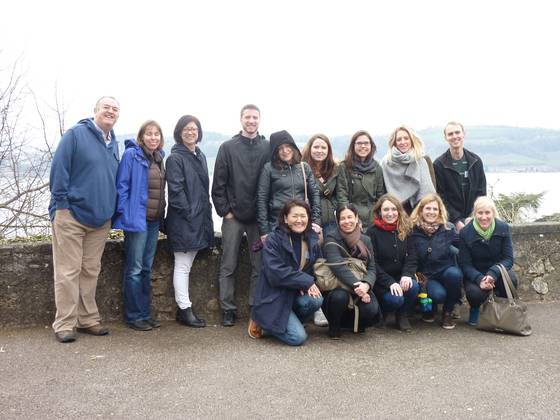
On Friday, after a short introduction by Prof. David Britain, Dr. Andrea Sudbury, who went to the Falkland Islands, and Prof. Kazuko Matsumoto, who went to Micronesia, were the first to discuss the many difficulties researchers face when doing sociolinguistic fieldwork. Both revealed that whereas certain problems that researchers face are often of a similar origin, the approaches to such problems can differ greatly depending on the cultural and sometimes even climatic differences. At the end of the afternoon, five of the doctoral participants presented their own research, most of which was still in its early stages. As one of the participants, I found this a most profitable endeavour since all of the experts were able to give useful feedback and tips, and most of the doctoral students were introduced to different topics and approaches in the field.
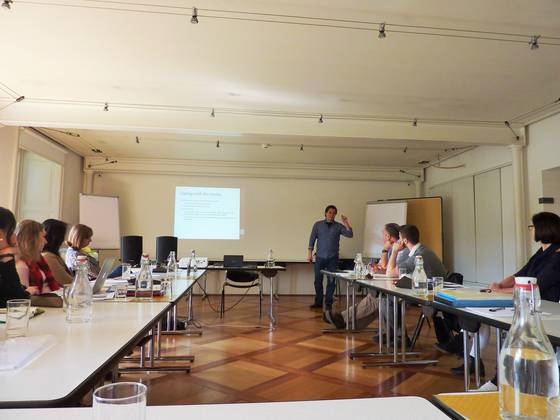
On Saturday morning, Dr. Andrea Sudbury led an interactive workshop in which she asked all participants to think about and subsequently discuss the different topics discussed on Friday, stressing the practical aspect of getting to know the people you intend to interview for your research as well as their culture. As was the case the day before, everyone could have done with much more time to discuss every possible aspect of the field, and, unsurprisingly, both the coffee and lunch breaks were used well to continue many discussions.
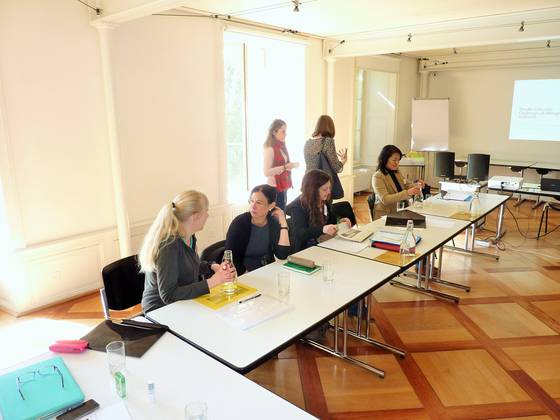
Prof. Daniel Schreier from the University of Zürich, who presented other possible solutions to many earlier discussed problems, concluded the morning session, and after the lunch break, the remaining doctoral students presented their research. The day was concluded with a guided tour through the lovely city of Murten, and, as was the case on Friday, a most delicious dinner was offered back at the Schloss in Münchenwiler.
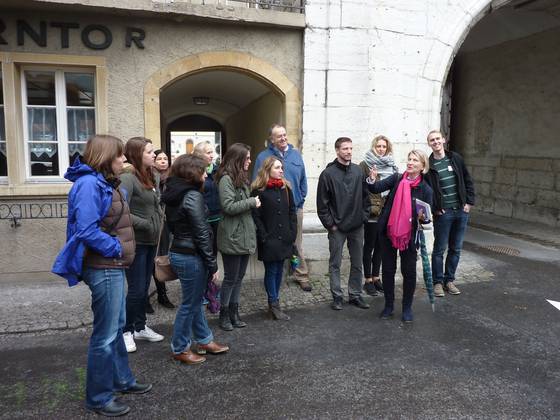
Sunday morning consisted of another interactive seminar, which was hosted by Prof. Kazuko Matsumoto, and a talk by Nicole Eberle from the University of Zürich. Both speakers offered, once again, some new insights into the practical aspects of sociolinguistic research.
The speakers at the workshop successfully managed to present, highlight, question and discuss the many different practical aspects of carrying out sociolinguistic fieldwork. Many relevant insights and methodologies were offered to all the doctoral students who participated, notably also to students who work in different research fields.
On behalf of all the participants, I wish to thank the organisers once again for such an interesting and, most of all, extremely useful workshop.
